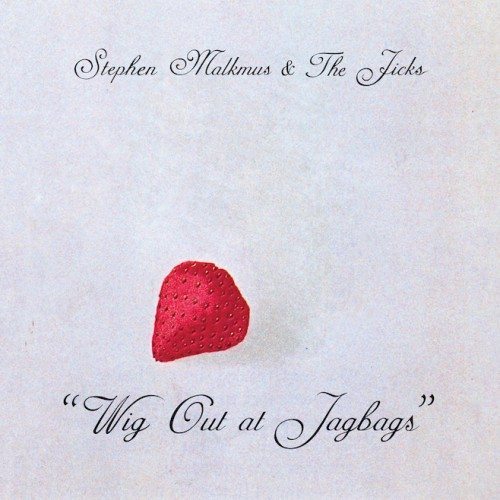Wig Out at Jagbags
 It’s here! The new Stephen Malkmus album! In his band Pavement, Malkmus didn’t just play indie rock – he was at the forefront of it. Along with luminaries such as Frank Black and Thurston Moore, his name is one of the most recognisable in the genre, and he will probably go down in musical history as pioneering one of the most popular genres of the past couple of decades. Now comes his sixth solo album, and given his legacy you’d expect a level of hype to come along with it that matches Yeezus or Reflektor.
It’s here! The new Stephen Malkmus album! In his band Pavement, Malkmus didn’t just play indie rock – he was at the forefront of it. Along with luminaries such as Frank Black and Thurston Moore, his name is one of the most recognisable in the genre, and he will probably go down in musical history as pioneering one of the most popular genres of the past couple of decades. Now comes his sixth solo album, and given his legacy you’d expect a level of hype to come along with it that matches Yeezus or Reflektor.
There’s just one problem: Stephen Malkmus doesn’t matter anymore. In fact, he probably hasn’t mattered for a while. The final Pavement release came all the way back in 1999 in the form of the underrated Terror Twilight, and that was that. Malkmus’s solo career has gone down as a footnote in the band’s history, despite this album marking the point at which he has become more prolific on his own than in Pavement. The numbers speak for themselves: according to Last.FM, Stephen Malkmus and the Jicks have only seven percent of Pavement’s total plays. Every self-respecting music fan has spun Slanted and Enchanted a couple of dozen times, but when was the last time you listened to Mirror Traffic?
Whether or not this is more of an indictment on the music itself or the fans is a discussion for another time, but it’s a shame nonetheless. It’s a shame because whilst it never manages to top his efforts in Pavement, albums like Wig Out at Jagbags certainly do a fine job of matching the band’s legacy in a way that others’ latest releases (ahem, Pixies) have not. Malkmus addresses this perceived irrelevance head-on on one track, ‘Rumble at the Rainbo’, which kicks off with a sample of some shouting (presumably to a long-gone crowd) “this one’s for you, granddad!” The song continues in a similar vein, describing an apparent reunion tour with “no new material” (ahem, Pixies) and culminating in the line “No one here has changed and no one ever will” being repeated. Malkmus is more than aware of how he is perceived; in a recent interview he stated he’s come to accept he doesn’t fill up venues the way he used to. If this song’s anything to go by though, he doesn’t seem to care.
Albums like Wig Out at Jagbags certainly do a fine job of matching Pavement’s legacy
One thing he hasn’t lost over the past twenty-or-so years are his verbal witticisms. Malkmus is a notoriously good Scrabble player, and so naturally his vocabulary is stuffed to a degree that would put Susie Dent to shame. It allows him to come up with all manner of phrases; the line “We lived on Tennyson and venison and The Grateful Dead” on lead single ‘Lariat’ is especially satisfying to listen to. It wouldn’t be too much of a stretch to assume he enjoys the similarly verbally-minded board game Scattergories – there is a song on the album with the same title, after all. Here, his propensity to experiment with word combinations is turned up to eleven, to the extent that not even the good people at RapGenius can quite figure out every line: “Mascara and Rye?”
The musicianship on the record is also consistently very good. It can at times sound like some friends getting together to hash out anything; in fact, Malkmus has almost confirmed this was the case. When your friends are as competent as the musicians he assembled and called the Jicks though, that’s no bad thing. Drummer Jake Morris shines on the opening track ‘Planetary Motion’, which features a rhythm that stops and starts to great effect, and Malkmus’s riffs on lead guitar are always great. However, for the most part the Jicks rarely become more than his backing band, and it’s here that Wig Out at Jagbags falters in comparison to his earlier work with Pavement. In that band there was always interplay between bass, drums, guitar and vocals, but to the album’s detriment it’s largely absent here.
Stephen Malkmus and the Jicks are too similar to Pavement to ever escape the comparison, for better or for worse. For one, despite being 47 his voice hasn’t changed a bit, and he’s still recognisable as the man behind indie classics like ‘Summer Babe’ and ‘Range Life’. And it’s true: this album isn’t as excellent as Crooked Rain, Crooked Rain or Wowee Zowie. But it is still very, very good, and it’s far better than the reception to his latter day work would have you believe.
Similar To: Bill Callahan, Cass McCombs
MP3: ‘Lariat’

Comments